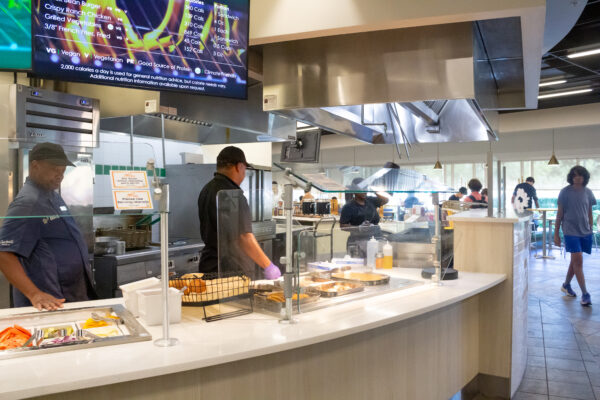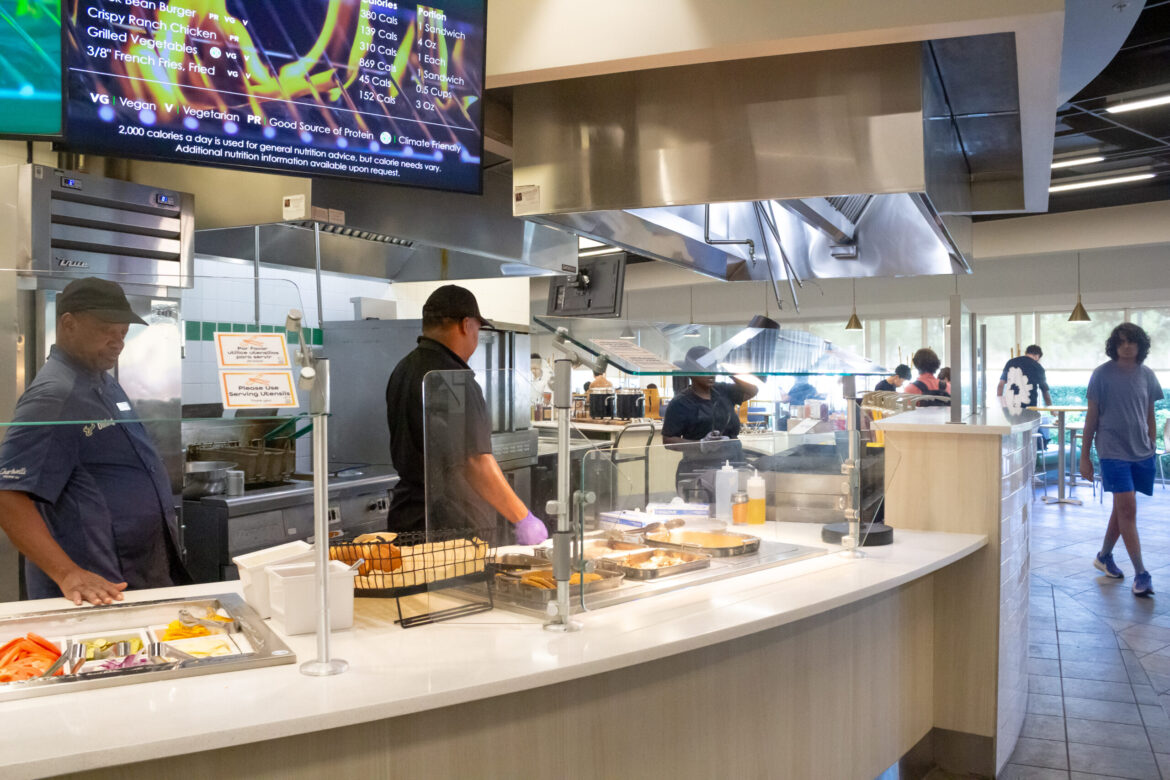 USF students said they have mixed feelings about the change in dining providers. ORACLE PHOTO/VIOLET VASQUEZ PIMENTEL
USF students said they have mixed feelings about the change in dining providers. ORACLE PHOTO/VIOLET VASQUEZ PIMENTEL
USF Dining switched food providers over the summer — and students are weighing in on the changes after a semester.
USF switched from its 22-year partner, Aramark, to Chartwells as a cost-saving measure. Chartwells officially began operating at the university in June.
USF Dining said Chartwells renovated dining halls across USF to provide more consistency and individuality across campus to cater to students.
At USF Tampa, these halls include Juniper Dining, Argos Exchange and The Hub.
Zoe Tate, a sophomore health sciences major, said she has mixed feelings about the switch in food providers.
Although Tate said she likes some of the new options on the updated menus — including new desserts and vegetable options — she misses how some foods tasted last spring.
“I miss the way they made the spaghetti sauces [because] now it feels like it’s watered down,” Tate said.
Tate said The Hub has been a “hit or a miss” for some of the food, including the pasta, and wishes there were more consistency in quality.
“I feel like when I went to The Hub last year, I knew what to expect out of the stations they had,” Tate said. “Now, although the options are ‘healthier,’ the food just doesn’t taste as good.”
Related: USF’s dining provider switch leads to closure of Pinnacle Hall restaurants
Sawan Patel, a senior environmental science and policy major, said the taste and quality of the food in Juniper Dining is better than in previous semesters.
USF Dining said Juniper Dining has earned the “highest ratings” in student satisfaction, and said its 10 stations are attractive to students because of the variety of food available.
Patel said he likes that there are more options for different cultural foods at Juniper Dining — which he said makes dining more “interesting.”
“I’d say the food’s definitely better,” Patel said. “It just tastes better in a way [and] it feels more fresh.”
Patel said he “usually” gets the bean burger from Juniper Dining Hall and has noticed an improvement in its taste from previous semesters.
Still, he said food can sometimes be cold or wet — something he attributes to the warmers USF Dining uses to store food.
“One thing I miss is how [Dining] would serve the food because now with the new warmers, it makes the food a little bit soggy,” Patel said.
Patel said the production speed has also decreased, which makes it frustrating to wait when lines are longer during lunch or dinner hours.
“At first, they would have [items] made to order, and now there’s like a five-minute wait for a dining hall burger,” Patel said.
Related: Compass Group to replace Aramark as USF’s dining, facilities partner
Jacob Cirino, a sophomore political science major, said he visits The Hub almost every day.
Cirino said he has noticed additions to the menu, including more gluten-free options and healthier choices at different stations.
These options give students greater flexibility and availability to accommodate dietary and allergen restrictions, he said.
“I do like the healthier options,” Cirino said. “I think that they really put a focus on the health of the students, and I like the variety.”
USF Dining said The Hub has “reintroduced” a dedicated allergen-friendly pantry to make the space more “inclusive and comfortable” for students.
Cirino said Chartwells seems to place more emphasis on sanitation than Aramark did, noting that staff appear more attentive to preventing cross-contamination at food stations.
“I think [cleanliness] is about the same as last year, but I think that [The Hub was] more intentional and structured with it this year,” Cirino said.
Related: Compass Group brings dining hall renovations, new restaurants to USF
Estefania Baron, a junior civil engineering major, said she likes that there is more variety in food options in the campus dining halls.
“I’ve noticed that [dining halls] have changed in terms of them occasionally serving fish and switching it up and serving asian foods,” Baron said.
However, Baron said the food stations at The Hub need more organization, especially when it comes to food labels.
“Last year, each individual item had its name and ingredients,” Baron said. “Now you have to ask the employees what is in each food item.”
Baron said The Hub has food labels that include calorie information.
Still, she said these labels do not include all the necessary information, such as ingredients or allergens, which can cause issues for students with dietary or allergy restrictions.
“I do not like the fact that the menu goes by so fast and you can never truly know what is being served, and sometimes it’s not even updated,” Baron said.


Dining and Cooking